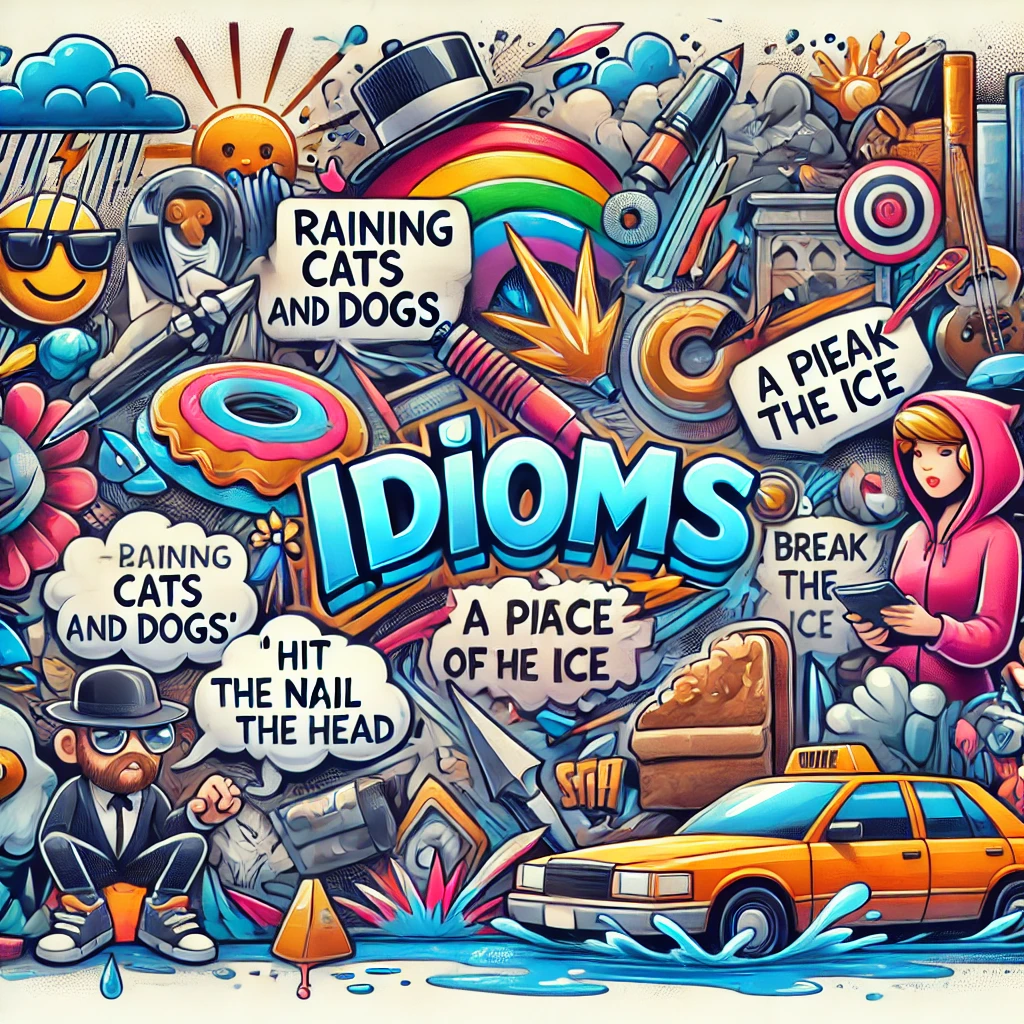Mastering Idioms

Learning goals
Understand Idioms: Learn what idioms are and how they can be used to express ideas differently in English.
Expand Vocabulary: Increase your range of expressions by incorporating idioms into your vocabulary.
Improve Communication: Use idioms to make your speech and writing more engaging and natural.
Definition of Idioms
Idioms are phrases or expressions that have a figurative meaning different from their literal meaning. Understanding idioms can enhance your ability to communicate effectively in English.
Usage
Idioms are commonly used in everyday conversations, literature, and media. They can make your language sound more native-like and interesting.
Practical Examples

Break the ice: To initiate conversation in a social setting.
- “She told a joke to break the ice at the party.”
Hit the nail on the head: To describe exactly what is causing a situation or problem.
- “You hit the nail on the head with your analysis of the problem.”
Piece of cake: Something very easy to do.
- “The test was a piece of cake.”
Once in a blue moon: Something that happens very rarely.
- “I see him once in a blue moon.”
Cost an arm and a leg: Something very expensive.
- “The new car cost an arm and a leg.”
Bite the bullet: To force yourself to do something unpleasant or difficult.
- “I decided to bite the bullet and start exercising.”
Let the cat out of the bag: To reveal a secret.
- “She let the cat out of the bag about the surprise party.”
Under the weather: Feeling ill.
- “I’m feeling a bit under the weather today.”
Spill the beans: To give away a secret.
- “Who spilled the beans about the surprise?”
Hit the books: To study hard.
- “I need to hit the books and prepare for the exam.”
The ball is in your court: It is up to you to make the next decision or take action.
- “I’ve done all I can; now the ball is in your court.”
Burn the midnight oil: To work late into the night.
- “She has been burning the midnight oil to finish her project.”
Caught between a rock and a hard place: Facing a difficult decision with no easy options.
- “I was caught between a rock and a hard place when deciding whether to move or stay.”
Kick the bucket: To die.
- “Unfortunately, the old dog kicked the bucket last night.”
Pull someone’s leg: To joke with someone.
- “Don’t worry, I’m just pulling your leg.”
Throw in the towel: To give up.
- “After several unsuccessful attempts, he decided to throw in the towel.”
A blessing in disguise: Something that seems bad at first but results in something good.
- “Losing that job was a blessing in disguise.”
Cut corners: To do something in the easiest, cheapest, or fastest way.
- “They cut corners to finish the project on time.”
Through thick and thin: In good times and bad times.
- “She has supported me through thick and thin.”
Actions speak louder than words: What you do is more important than what you say.
- “He promised to help, but actions speak louder than words.”
Learning activities
Idiom Matching Game (30 minutes)
Objective: Reinforce understanding of idioms through a fun and interactive game.
Instructions:
- Preparation: Cards with idioms on one set and their meanings on another set.
- Group Work: You will work in small groups to match the idioms with their correct meanings.
- Class Review: We will discuss each idiom and its meaning with the entire class. Each group explains their matches and provides an example sentence.

Idiom Story Creation (30 minutes)
Objective: Apply idioms in context by creating short stories.
Instructions:
- Individual Work: Each student picks 5 idioms from the list and writes a short story incorporating all of them.
- Pair Work: Pair up with a classmate and share your stories.
- Class Sharing: Select a few stories to be read aloud in class, and discuss how idioms were used in context.

Additional Resources
